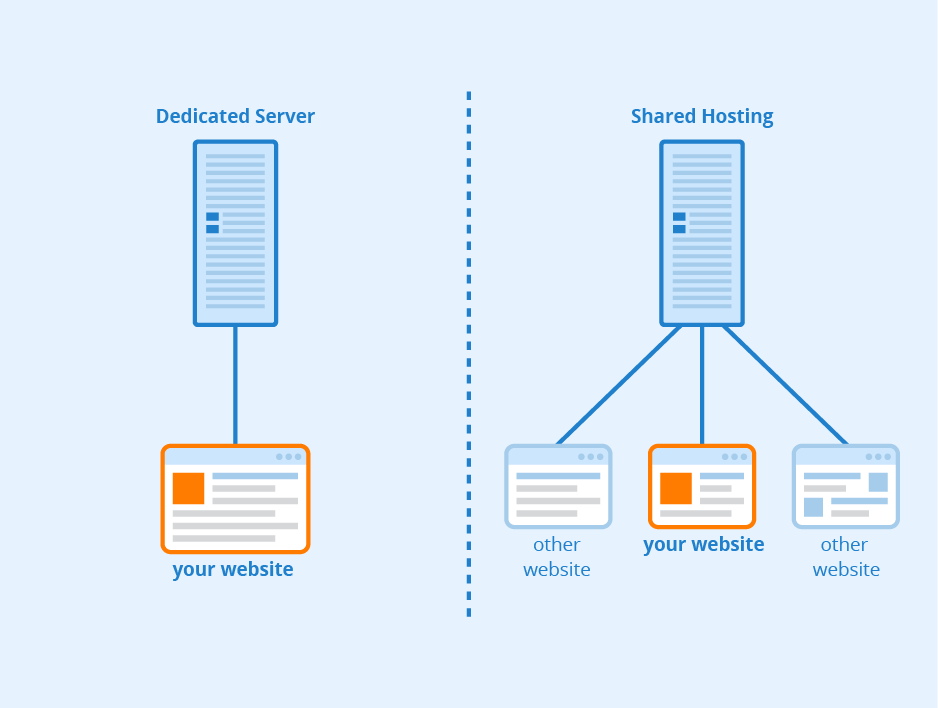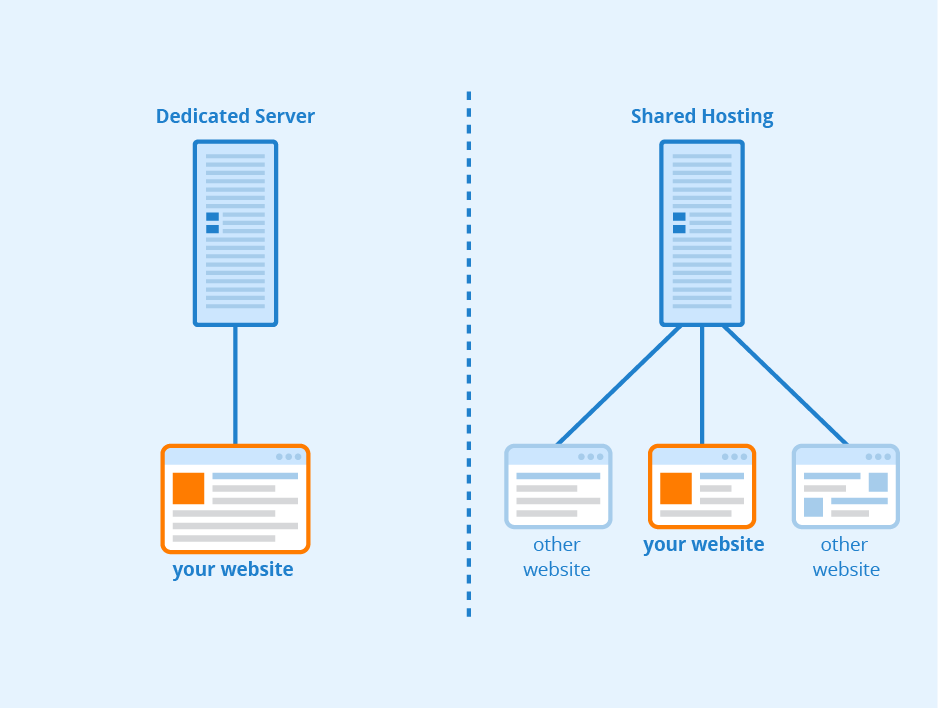Shared hosting and dedicated hosting are two different types of web hosting services. Shared hosting involves multiple websites sharing resources on the same server, which makes it a more affordable option. On the other hand, dedicated hosting provides exclusive use of a server, offering better performance, security, and customization capabilities. Shared hosting is recommended for small websites with low traffic, while dedicated hosting is ideal for large, resource-intensive websites that require maximum control and reliability.
When it comes to hosting your website, understanding the difference between shared hosting and dedicated hosting is crucial. Did you know that shared hosting is like renting an apartment in a building, while dedicated hosting is like owning your own house? With shared hosting, multiple websites share the same server resources, which can affect performance and security. On the other hand, dedicated hosting provides you with exclusive access to all server resources, giving you better control and performance for your website.
Shared hosting has been around for years and is a popular choice for small businesses or individuals who are just starting their online presence. It offers an affordable solution as the cost is shared among multiple users. However, the downside is that your website’s performance can be affected by other websites on the same server. In contrast, dedicated hosting is a more reliable option for websites with higher traffic or resource-intensive applications. You have full control over the server and can customize it to fit your specific needs, ensuring optimal performance and security. While it may be pricier than shared hosting, the benefits outweigh the cost for those who require more control and resources.

Understanding Shared Hosting and Dedicated Hosting
When it comes to hosting a website, there are various options available, each with its own set of advantages and disadvantages. Two commonly used hosting services are shared hosting and dedicated hosting. Shared hosting involves multiple websites sharing the resources of a single server, while dedicated hosting offers exclusive use of an entire server for a single website.
The main difference between shared hosting and dedicated hosting lies in the level of control, resources, and performance they offer. Shared hosting is generally more affordable and suitable for small websites or beginners, while dedicated hosting provides enhanced security, customization options, and high-performance capabilities, making it ideal for larger businesses or websites with high traffic.
In this article, we will delve into the details of shared hosting and dedicated hosting to help you understand the key differences between the two and determine which option best suits your needs.
Shared Hosting: A Cost-Effective and Beginner-Friendly Option
Shared hosting refers to a hosting arrangement where multiple websites share the resources of a single physical server. This means that the server’s resources, including CPU, RAM, disk space, and bandwidth, are divided among several websites hosted on the same server.
Shared hosting is often the most affordable option available as the cost of the server is distributed among multiple users. It is an excellent choice for small businesses, personal websites, and beginners who don’t have large budget constraints or significant technical knowledge.
Advantages of Shared Hosting:
- Affordable: Shared hosting plans are generally much cheaper compared to dedicated hosting plans.
- Easy to Use: Shared hosting providers typically offer user-friendly control panels, making it simple to manage your website.
- Technical Support: Shared hosting providers typically offer technical support to help resolve any issues you may encounter with your website.
- Shared Resources: The shared nature of the hosting means that the hosting provider takes care of server maintenance, updates, and security, allowing you to focus on running your website.
Disadvantages of Shared Hosting
- Performance Limitations: Since resources are shared among multiple websites, if one website experiences high traffic or consumes a large amount of resources, it can affect the performance of other websites hosted on the server.
- Limited Customization: Shared hosting often comes with limitations on server configurations and software installations, which can hinder your ability to customize your website.
- Security Concerns: The security of your website is dependent on the other websites sharing the same server. If one website is compromised, it can potentially affect the security of other websites on the server.
Despite these limitations, shared hosting remains a popular choice for many individuals and businesses due to its affordability and ease of use.
Dedicated Hosting: Unparalleled Control and Performance
Dedicated hosting, as the name suggests, involves the use of an entire server dedicated to a single website. Unlike shared hosting, where resources are divided among multiple users, dedicated hosting provides exclusive access to all the server’s resources.
Dedicated hosting is typically used by large businesses, e-commerce websites, and high-traffic websites that require more control over their server environment and demand maximum performance.
Advantages of Dedicated Hosting:
- Enhanced Performance: With dedicated hosting, you have access to all the server’s resources, resulting in faster loading times and a smoother user experience for your website visitors.
- Complete Control: Dedicated hosting allows you to have full control over your server configurations, software installations, and security settings, providing a high level of customization.
- Scalability: Dedicated hosting offers more scalability, allowing you to easily upgrade your server resources as your website grows and experiences higher levels of traffic.
- Enhanced Security: Since you are the sole user of the server, dedicated hosting provides a higher level of security compared to shared hosting, reducing the risk of other websites affecting the security of your site.
Disadvantages of Dedicated Hosting
- Higher Cost: Dedicated hosting plans are more expensive compared to shared hosting plans due to the exclusive use of server resources.
- Technical Expertise Required: With dedicated hosting, you need to have a certain level of technical knowledge to manage and maintain your server effectively.
- Responsibility for Server Management: With dedicated hosting, you are responsible for server maintenance, updates, and security, which may require additional time and effort.
Dedicated hosting provides the utmost control and performance, making it suitable for websites with high traffic and complex requirements. While it may be more expensive and require more technical expertise, the benefits often outweigh the drawbacks for businesses that require a premium hosting solution.
Conclusion
In conclusion, the difference between shared hosting and dedicated hosting lies in the level of control, resources, and performance they offer. Shared hosting is a cost-effective and beginner-friendly option, suitable for small websites and individuals with limited technical knowledge. On the other hand, dedicated hosting provides unparalleled control, performance, and security, making it ideal for larger businesses and websites with high traffic.
Ultimately, the choice between shared hosting and dedicated hosting depends on your specific needs and budget. Consider the size and requirements of your website, the amount of traffic you expect, and the level of control and customization you require. Evaluating these factors will help you make an informed decision and choose the hosting option that best aligns with your goals.
To explore hosting options and find the right solution for your website, consider consulting a reputable hosting provider.
- Shared hosting is like living in an apartment complex, where resources are shared among many tenants.
- Dedicated hosting is like living in your own house, where all server resources are dedicated to your website.
- Shared hosting is more cost-effective, while dedicated hosting offers more control and performance.
- In shared hosting, slow performance or security issues on one website can affect others, while in dedicated hosting, you have exclusive access to all resources.
- Shared hosting is suitable for small websites with low traffic, while dedicated hosting is ideal for large websites with high traffic or special requirements. Shared hosting and dedicated hosting are two different types of web hosting services. In shared hosting, multiple websites are hosted on a single server, which means resources like CPU, RAM, and disk space are shared among all the websites.
- Shared hosting is like living in an apartment complex, where resources are shared among many tenants.
- Dedicated hosting is like living in your own house, where all server resources are dedicated to your website.
- Shared hosting is more cost-effective, while dedicated hosting offers more control and performance.
- In shared hosting, slow performance or security issues on one website can affect others, while in dedicated hosting, you have exclusive access to all resources.
- Shared hosting is suitable for small websites with low traffic, while dedicated hosting is ideal for large websites with high traffic or special requirements.
Dedicated hosting, on the other hand, provides an entire server exclusively for one website. This means that all the resources of the server are dedicated to that specific website, resulting in better performance and more control.
Key Takeaways:
Shared hosting and dedicated hosting are two different types of web hosting services. In shared hosting, multiple websites are hosted on a single server, which means resources like CPU, RAM, and disk space are shared among all the websites.
Dedicated hosting, on the other hand, provides an entire server exclusively for one website. This means that all the resources of the server are dedicated to that specific website, resulting in better performance and more control.

